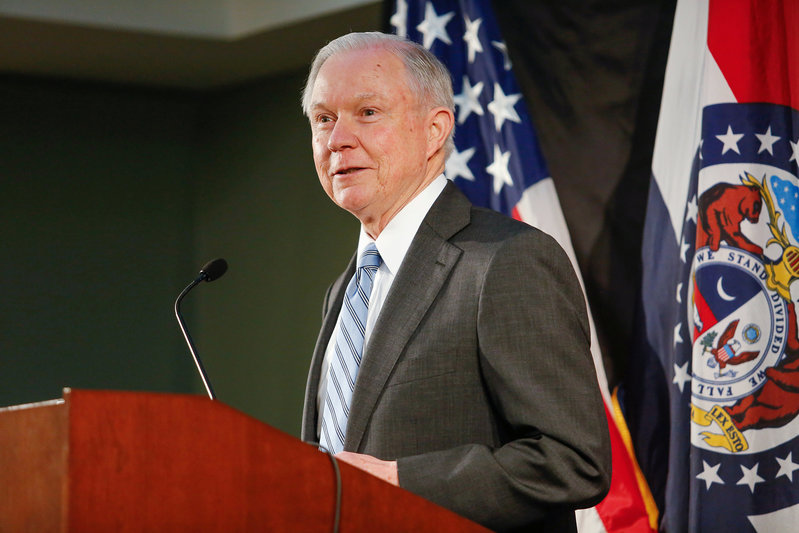Cities intent on overhauling their embattled police departments vowed to continue their reform efforts, after Attorney General Jeff Sessions released a memo Monday ordering a review of the agreements that had previously been reached between the Justice Department and local police forces.
The news threw into jeopardy agreements that are currently being negotiated, including one with the Chicago Police Department, as well as one in Baltimore that had been finalized in the final days of the Obama administration, but has not yet been approved by a judge.
The agreements, known as consent decrees, have been used to enact local policing reforms as early as the 1990s, and were used by both the Clinton and the George W. Bush administrations. But the decrees became a defining characteristic of the Obama administration’s Justice Department, which issued more than a dozen.
Sessions has previously criticized court-enforced consent decrees, arguing that while they are “not necessarily a bad thing,” they could unfairly penalize an entire police department when wrongdoing may be isolated to a few individuals.
The DOJ’s memo on Monday said existing decrees will be included in the broad review of “all Department activities,” but it’s unclear how the agreements could be affected – the DOJ cannot unilaterally reverse them without court intervention, according to The New York Times.
On Tuesday some cities with court-enforced consent decrees sought to quell concerns that long-implemented reforms could be undone. The New Orleans Police Department, which enacted its consent decree in 2012, announced that federal oversight will continue and no changes will occur.
"The court will continue to monitor the implementation of the decree that benefits the citizens of New Orleans and is supported by the city and the police department," Jonathan Aronie, the lead monitor for the police department's consent decree, told the Times-Picayune.
Yet police unions in some cities have also argued that consent decrees have been expensive, ineffective, or implemented too hastily, and told media they welcome Sessions' review of the arrangements.
"We look forward to the results of Attorney General Sessions review and opinion concerning the very costly and largely ineffective consent decrees which have been forced upon cash strapped cities by the Obama Administration, Cleveland included," Steve Loomis, head of Cleveland's police union, told local NBC affiliate WKYC.
'Reform is in our self-interest'

Late on Monday, the Justice Department also requested an additional 90 days to review an agreement in Baltimore and whether it fits with "directives" of the Trump administration. A public hearing in a federal court in Maryland has been set for Thursday.
"The Attorney General and the new leadership in the Department are actively developing strategies to support the thousands of law enforcement agencies across the country that seek to prevent crime and protect the public," the department wrote in a legal filing.
"The Department is working to ensure that those initiatives effectively dovetail with robust enforcement of federal laws designed to preserve and protect civil rights."
But Baltimore officials, including the mayor and the police commissioner, quickly condemned the Justice Department's request, noting that the police department there has been working to build trust with the community.
The Baltimore consent decree was the result of a sweeping federal review of the city's police department practices following the 2015 death of Freddie Gray, who died after sustaining an injury while he was in police custody.
The review found that the police department had systematically engaged in discriminatory practices and civil rights violations. The resulting agreement largely outlined changes to the way officers are trained in resolving conflicts without resorting to force.
"Any interruption in moving forward may have the effect of eroding the trust that we are working hard to establish," Baltimore Mayor Catherine Pugh said in a statement.

Chicago Mayor Rahm Emanuel and police chief Eddie Johnson have also vowed to press ahead with reforms within the city's police department, noting that a plan has already been drafted in recent weeks.
The DOJ began investigating the police department following the release of a video that showed a white police officer firing 16 shots at Laquan McDonald, a black teenager.
The subsequent report was a damning critique of the department's policing practices, which consisted of a pattern of "unreasonable" and sometimes deadly force, constitutional violations, and insufficient training and supervision for officers.
"Reform is in our self-interest and that is why Chicago has been, is, and will always be committed to reform," Emanuel said in a statement.
Sessions has been particularly skeptical of the report on Chicago's police department, arguing that "some of it was pretty anecdotal, and not so scientifically based." Yet he also conceded he had not read the report.

